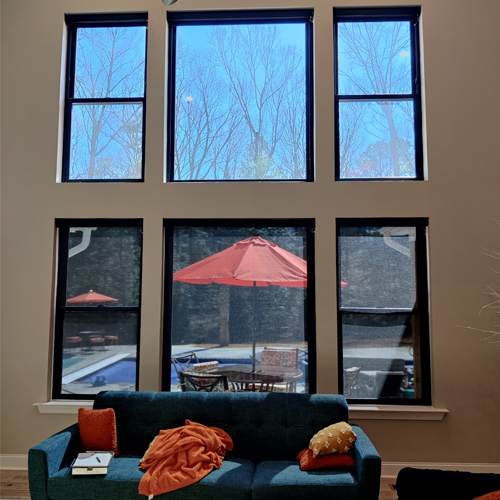Residential Window Tint: Secure Your Furniture from UV Damage
Wiki Article
Exactly How Residential Window Tinting Boosts Your Home's Energy Performance
Residential window tinting presents a compelling option for home owners seeking to improve power efficiency within their home. By using specialized films to home windows, it effectively lowers warmth transfer, thus supporting indoor temperature levels and lessening the need for excessive home heating or air conditioning. This not just stops energy consumption yet also offers a much more comfy setting by reducing glare. Nonetheless, comprehending the subtleties of just how tinting works and selecting the proper type for your home can be essential. Curiously, what factors should one think about before making this financial investment?Comprehending Home Window Tinting
Recognizing home window tinting is crucial for property owners looking for to boost both comfort and power effectiveness in their living rooms. Residential Window Tint. Window tinting includes the application of a thin film to the interior or exterior surface area of glass home windows. This movie can considerably modulate the amount of sunlight and heat that gets in a home, hence affecting interior climate conditionsThere are different types of window tinting movies available, each with distinctive buildings. The performance of home window tinting is often measured by its Visible Light Transmission (VLT) portion, which indicates just how much light can pass via the movie.
Benefits of Energy Efficiency
Home window tinting not only improves looks yet likewise plays a significant role in improving energy performance within household spaces. By reducing warm transfer through windows, colored movies create an extra steady indoor environment, which can result in significant reductions in power intake for heating & cooling. This energy efficiency converts right into reduced energy bills, supplying home owners with significant lasting cost savings.
Additionally, window tinting enhances the convenience of living areas. By lessening glare and blocking dangerous UV rays, tinted home windows create a more pleasant setting, which can bring about improved health for owners. The security against UV rays additionally helps protect furniture and flooring from fading, contributing to the longevity of household things.
Just How Tinting Works
Tinting movies run via a mix of sophisticated materials and technologies created to regulate the amount of solar power going into a home. Primarily composed of polyester, these movies usually include ceramic or metal fragments that mirror and absorb heat. This twin capability allows them to substantially decrease the penetration of ultraviolet (UV) rays and infrared radiation while allowing noticeable light to go through.The effectiveness of window tinting is gauged by its solar heat gain coefficient (SHGC), which suggests exactly how much solar power is transmitted with the window. Reduced SHGC values are get more more effective as they represent greater warm being rejected. In addition, window colors can include a variety of tones, permitting house owners to tailor their aesthetic choices while boosting power effectiveness.
Furthermore, these films serve as a barrier, preventing warmth loss during colder months by reflecting interior warmth back right into the home. This thermal insulation impact matches the air conditioning advantages gotten during warmer months, adding to a well balanced indoor environment year-round. By handling solar power effectively, domestic window tinting helpful resources not just improves comfort however also plays a vital role in minimizing power usage and decreasing energy bills.
Selecting the Right Tint

There are different kinds of home window movies available, including dyed, metalized, and ceramic. Ceramic films offer outstanding warmth control without endangering visibility and are very long lasting, making them a prominent selection.
Noticeable light transmission (VLT) is an additional vital factor, as it indicates the amount of natural light that can pass with the tinted glass. Property owners must choose a color with a VLT that enhances their illumination preferences while still offering ample glare reduction.
Furthermore, evaluating the solar warmth gain coefficient (SHGC) can aid identify how well a tint can block warm from sunlight. A lower SHGC indicates much better warm control, eventually enhancing energy effectiveness.
Installation and Maintenance Tips
Correct installation and upkeep are vital parts in maximizing the benefits of property window tinting. To achieve optimum results, it is suggested to hire a certified expert for setup. This makes sure that the color is applied appropriately, avoiding air bubbles, wrinkles, or misalignment that might endanger performance. Specialists likewise use specialized tools and techniques, which can boost the sturdiness and effectiveness of the color.Following installment, upkeep is important to prolong the life of the home window movie. It is recommended to wait at the very least one month prior to cleaning up the colored home windows to enable the glue to cure completely. sites When cleansing, utilize a soft fabric and a mild, ammonia-free cleaner to stay clear of damaging the film. Avoid rough products that might damage the surface.
Dealing with these problems promptly can prevent further damage and preserve energy performance. By adhering to these installment and maintenance suggestions, home owners can ensure their home window tinting proceeds to offer significant power savings and comfort for years to come.
Final Thought
In final thought, domestic window tinting offers as a reliable remedy for boosting power effectiveness within homes. By reducing heat transfer and blocking dangerous UV rays, window movies add to lower power consumption and boosted indoor convenience.Window tinting includes the application of a slim film to the interior or exterior surface of glass windows. By lowering warm transfer with windows, tinted films develop a more secure indoor environment, which can lead to considerable reductions in power usage for heating and cooling.The efficiency of window tinting is determined by its solar heat gain coefficient (SHGC), which indicates just how much solar power is transmitted through the home window. By managing solar energy properly, residential window tinting not only enhances convenience however likewise plays a crucial duty in lowering energy intake and reducing energy bills.
By reducing heat transfer and blocking dangerous UV rays, home window films contribute to lower energy consumption and boosted interior convenience.
Report this wiki page